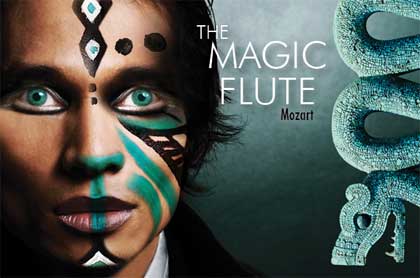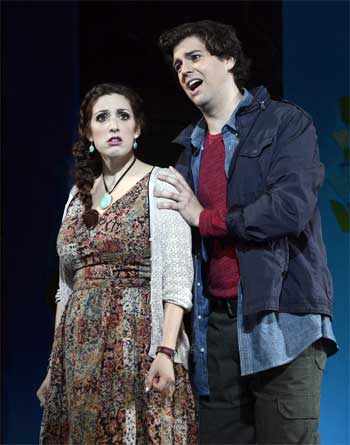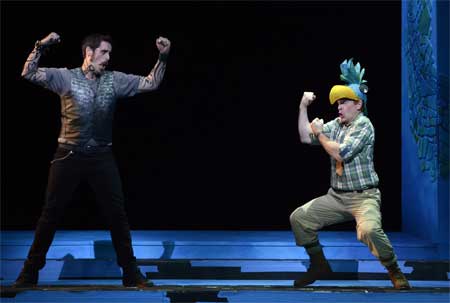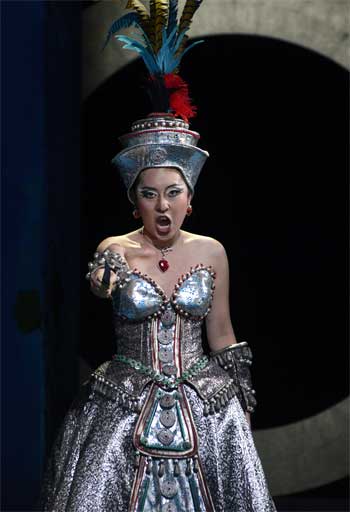Opera (1791)
Music by Wolfgang Amadeus Mozart
Libretto by Emanuel Schikaneder
World Premier
New English Adaptation
by Kelley Rourke, Leon Major and John Conklin
Boston Lyric Opera
Shubert Theatre
Boston, MA
October 4-13, 2013
Conductor: David Angus
Stage Director: Leon Major
Set Designer: John Conklin
Costume Designer: Nancy Leary
Lighting Designer: Mark Stanley
Lyrics and Projected English Titles: Kelley Rourke
Wigs and Makeup Designer: Jason Allen
With Zach Borichevsky (Tamino), Deborah Selig (Pamina), Andrew Garland (Papageno), Neal Ferreira (Monostatos), So Young Park (Queen of the Night), Meredith Hansen (First Lady), Michelle Trainor (Second Lady), Nicole Rodin (Third Lady), David Cushing (Sarastro), David Kravitz (First Spirit Messenger), Omar Najmi (Second Spirit Messenger), Isaac Bray (Third Spirit Messenger), Thomas Potts (First Boy), Timothy O’Brien (Second Boy), Andrew Peruzzi (Third Boy), Chelsea Basler (Papagena)

Boston Lyric Opera
The traditional story of the opera has been somewhat adjusted, but done so in an interesting and appropriate way.
It starts with four college students on a trip to the Mayan ruins in the Yucatan in Mexico. One of them – Tommy – gets bitten by a snake and goes into hallucinations which then becomes the spur for the more traditional goings on in The Magic Flute.
All of a sudden, Tommy becomes Tamino and Pam becomes Pamina, and Papageno, Monostatos, Sarastro and the Queen of the Night appear. Tamino is set by the Queen of the Night to rescue her daughter Pamina from Sarastro, but when Tamino actually comes into contact with Sarastro he sees that he is not really bad. Meanwhile, Monostatos tries to seduce Pamina, and Papageno, who is Tamino’s sidekick, searches for love, which he eventually finds, in Papagena.
The Queen of the Night and Sarastro are warring spouses it turns out, and they have a bit of reconciliation to attend to as well.

Zach Borichevsky as Tamino
in “The Magic Flute”
Photo: Eric Antoniou
for Boston Lyric Opera © 2013
What a great, colorful, lively adaptation this is. And what a great libretto it is which supports it, written with an easy, witty vernacular that makes good, down-to-earth sense out of the somewhat arcane themes in the original.
The idea of making the premise the vacationing of four college students in the Yucatan struck me as a great idea once I saw it in context. When I had first heard that this production wove some kind of Mayan stuff into the traditional Egyptian motifs of The Magic Flute, I worried that it was going to try to be cute without necessarily having any reason for doing so. But my qualms were answered as soon as I got into the rhythm of this production which used its adjusted narrative wisely and well.

Andrew Garland as Papageno
in “The Magic Flute”
Photo: Eric Antoniou
for Boston Lyric Opera © 2013
So, a jealous member in the gang of four students becomes, in the hallucinogenic vision, the horrific Monostatos; the adjustment works perfectly.
There is some really wonderful singing here, and some of it comes from slightly unexpected quarters.
Andrew Garland, as Papageno, has a relaxed and rich baritone which seems to fit effortlessly into his considerable talents as a comic actor.
Deborah Selig, as Pamina, has a full and resonant contralto which penetrates and suffuses the hall, particularly during the painful aria in which she responds to Tamino’s and Papageno’s refusal to speak with her. (Sarastro has commanded them not to, as a test.)
Neal Ferreira, as Monastatos, is a real comic hit and has a great baritone to support it. And, he is a dashing villain. Suddenly, by virtue of this interpretation, that role, which always seemed odd and slightly incomprehensible to me, came through.
Interestingly, David Kravitz, as First Spirit Messenger, makes a strong impression, both with the quality of his rich voice, and despite relatively little to do on stage, the slightly ironic quality of his demeanor when he does have a moment or two.
Zach Borichevsky, as Tamino, grew into his tenor as the evening went on, eventually seeming more relaxed and robust than he did at the outset.
So Young Park, as the Queen of the Night, has a spectacularly agile coloratura and her adept vocal pyrotechnics created a strong appreciation from the audience.

in “The Magic Flute”
Photo: Eric Antoniou
for Boston Lyric Opera © 2013
The entire cast, it seems, is a bunch of twenty-somethings, except for the trio of boys who are well under ten. How charming and refreshing to have all of this youthful energy on one stage and to show such artistic promise in so many quarters.
The design of the production is simple but eloquent. Layers of blue frames surround the stage, while various kinds of Mayan snake motifs get dropped from above or brought from the side. There are also great moments with large orbs representing sun and moon. The whole idea that the Mayans were obsessed with astronomy fits in very well here.
Not only is the libretto witty, but there is considerable wisdom in it. The Magic Flute is perhaps Mozart’s strongest statement as a Freemason and represents the deeply humanistic values associated with that movement. The emphasis of this adaptation, which, by the way, is extremely easy to follow and which the singers render impeccably, is upon good, ethical horse sense; this gives an important twist to an opera which, as easily, can get interpreted in a numinous and cultish way. The present approach makes good on what were very likely Mozart’s best intentions.
The Così Fan Tutte the Boston Lyric Opera did in the spring also had a great, English libretto, and spare, but elegantly beautiful, staging. What a treat to see both productions in the same year, and to have these two most playful, but also deeply serious, operas of Mozart’s rendered so thoughtfully and intelligently.
– BADMan
Leave a Reply